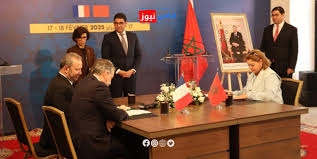Morocco, France Strengthen Partnerships in Gaming, Literature, Cinema and More

Rabat: France’s Minister of Culture Rachida Dati recognized on Tuesday Morocco’s progress in the gaming industry. She noted how the sector has expanded in recent years, attracting young Moroccans as well as international talent.
Speaking after a meeting at the International University of Rabat (UIR), where officials reviewed the development of the video game creator training program, Dati lauded Morocco’s efforts to boost the industry and provide young professionals with the skills to compete globally.
She attended the event alongside her counterpart, Morocco’s Minister of Culture and Youth, Mohamed Mehdi Bensaid.
Dati reaffirmed France’s commitment to deepening cultural cooperation with Morocco, announcing plans for further discussions on the subject in 2026. “This partnership benefits both economies and extends to a wider ecosystem beyond our borders,” she said.
She also spoke on Morocco’s growing role in the gaming industry, inviting the country to participate for the first time in the “Game CreaLab Francophone”, a residency dedicated to video game creation. France’s National Center for Cinema (CNC) has also expressed interest in working with Morocco on its planned Gaming City.
In this context, Dati welcomed the involvement of private companies, citing a new agreement with the French firm TA publishing, which plans to expand operations in Morocco.
Meanwhile, Mehdi Bensaid recalled Morocco’s growing role in the global gaming industry, noting the significance of its collaboration with France.
He pointed to the video game creator program as a key initiative, launched with ISART DIGITAL, ranked among the top video game development schools worldwide, alongside UIR and the French Embassy.
“The gaming sector presents major opportunities for Morocco’s economy, but realizing its full potential requires highly skilled professionals,” Bensaid said.
He added that the partnership with France has already provided Moroccan students with valuable training, solidifying the country’s appeal as a destination for international start-ups looking to invest in gaming.
Beyond the gaming sector, Dati also talked about the deep historical ties between the two countries, and that several agreements now support the preservation and promotion of Moroccan heritage.
A new framework looks to strengthen the Moroccan Cinematheque – a movie theater and archive center – with support from the CNC, the French National Audiovisual Institute (INA), and the National Library of France (BnF).
The partnership will help identify Moroccan films in French collections, restore and digitize them, and enrich the Cinematheque’s catalog with African films. French experts will also assist in training Moroccan professionals and developing the institution’s long-term vision.
France and Morocco also formalized cooperation in archives. France’s interministerial archive service will work with Morocco’s National Archives to modernize legislation, train archivists, and contribute to the development of a new facility that meets international preservation standards.
In terms of cultural heritage, a new agreement will target four historical sites: Lixus, Ighoud, the Hercules Caves in Tangier, and the Camel Cave in the Beni-Snassen Mountains.
Archaeology remains a key pillar of collaboration. A new partnership between Morocco’s INSAP and France’s INRAP will provide expertise in preventive archaeology, particularly in major infrastructure projects ahead of the 2030 FIFA World Cup. Experts from both countries will work on legislative updates and training programs to support Moroccan archaeologists.
France’s commitment to Moroccan culture even extends to literature, demonstrated by a new agreement between the National Library of Morocco and the BnF, which will support research and digitization efforts.
While Moroccan authors writing in French are well-known in France, those writing in Arabic have had less visibility. To address this, France’s National Book Center (CNL) has launched a program covering 70% of translation costs for Arabic-language Moroccan authors.
Moreover, Morocco will be the guest of honor at the Paris Book Festival in April, an opportunity to introduce French and international audiences to Moroccan literary talent.
She also noted Rabat’s upcoming title as UNESCO’s World Book Capital in 2026 and expressed confidence that culture would play more of an essential role in the 2030 World Cup.





